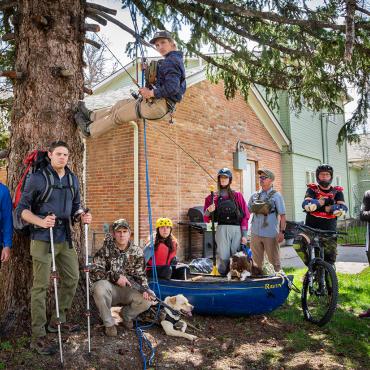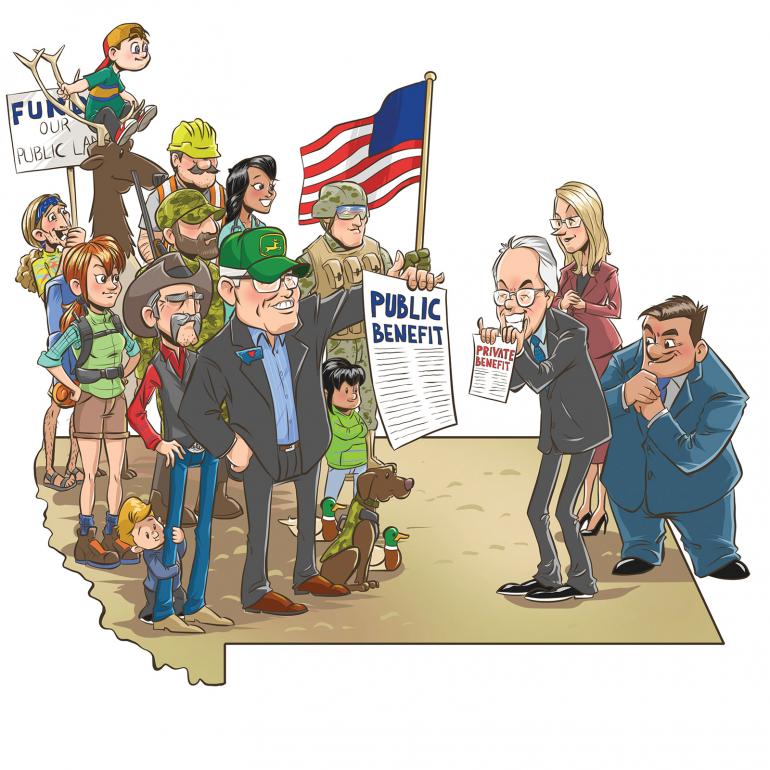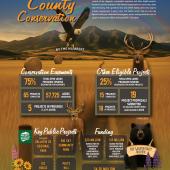The Good, the Bad, and the Ugly
Diving into Montana’s 68th legislative session.
As outdoor enthusiasts, we’re directly affected by the laws and regulations governing our public resources. So much so, that outdoor-oriented issues are often key topics during state elections. Campaigning politicians routinely include these issues among their focal points—but once in office, are they following through? Are they backing the issues that their constituents care about—that they themselves purported to care about—or are they turning the other direction? If you don’t know, then it’s high time you found out, so you can factor that in the next time you fill out your ballot. What follows is a rundown of how our local legislators voted on a few key bills surrounding public land, access, conservation, and fish & wildlife in this year’s legislative session. This is especially relevant for sportsmen and women, as a host of bills this session addressed hunting issues. (Note that this is an abridged tally; see our website for an extended rundown.)
House Bill 486: An act generally revising laws governing highway encroachments
County roads are important because they provide legal access to thousands of acres of otherwise-inaccessible public land and waters. This bill increases the fine for anyone illegally blocking a county road to a mandatory $100 per day (as opposed to the current: “liable to a penalty of not less than $10 or more than $500”).
House Bill 596: An act revising elk-hunting-access-agreement cooperator licenses
This bill is an amendment to the state’s Elk Hunting Access Agreement, which provides landowners with bull-elk tags in difficult-to-draw hunting districts in exchange for allowing public hunters on their land. The bill mandates that eligible landowners can receive one license for every three members of the public allowed to hunt their land (subject to total tag limits), and that at least one public hunter must hold an equivalent tag. It also prioritizes the applications of landowners who allow additional cow harvest on their land by public hunters, either during general season or shoulder seasons.
House Bill 635: An act establishing a landowner preference pool for nonresident big-game combination licenses
This bill mandates that 15% of the 17,000 annual nonresident big-game combination licenses (valid for both deer and elk) go to out-of-state landowners who own 2,500 acres or more in Montana. The bill originally passed the house and senate, but was returned by Governor Gianforte, who amended it such that every landowner with 2,500 acres or more would receive three licenses, as opposed to what was initially proposed: one tag for every 2,500 acres owned (up to five). The changes were rejected by both the house and senate, and the bill was sent back to the Governor’s desk. Proponents of HB 625 claim it will reduce crowding on public land; however, Backcountry Hunters & Anglers crunched the numbers and determined that only 213 nonresident landowners will qualify for these new licenses, making an insignificant dent in the 38,600 nonresident deer, elk, and elk/deer combo licenses that Montana issues annually (not including additional doe and cow tags).
Senate Bill 58: An act increasing the maximum annual Block Management Program allowable payment to landowners
This bill increases the maximum payment to landowners enrolled in Montana Fish, Wildlife & Park’s Block Management Program to $50,000 per year (previously $25,000).
Senate Bill 295: An act revising the laws related to the regulation of grizzly bears on delisting
This bill allows for the harvest of grizzly bears that are attacking or killing livestock, after the presumed eventual delisting of grizzlies as an endangered species. It also allows the state to set management quotas should grizzlies be delisted.
Senate Bill 442: An act revising the distribution of marijuana taxes
This bill would have reallocated funds from a sales tax on marijuana to a) maintaining county roads, and b) to a new Habitat Legacy fund that pays for wildlife-improvement projects on public and private land. The former sought to address the dire need for upkeep of degrading county roads in the state, which are critical for recreationalists, ranchers, and agricultural producers alike. The bill passed the house and the senate with bipartisan support but was vetoed by Governor Gianforte.
The following bills were killed in committee, and never saw the light of day in either the house, the senate, or both—some for better, some for worse.
House Bill 462: An act generally revising the distribution of marijuana taxes
Tabled by the house Appropriations Committee, this bill would have eliminated all marijuana taxes currently directed toward the Habitat Montana fund. Montana voters first approved Habitat Montana funding in 2020 by directing 20% of marijuana sales tax toward the initiative. Some of the funding was already stripped in the 2021 legislative session, but this bill aimed to wipe the slate clean. If passed, it would have diverted an estimated $30 million biennium away from improving access, preserving quality habitat, keeping working ranches on the landscape, and adding hunting opportunities.
House Bill 600: An act revising acreage requirements for landowner-preference hunting licenses
For landowners to qualify for elk “damage” tags, valid for cow elk in the units in which they own property, they must own 640 acres (one full section) or more of contiguous land, some of which must be used by elk. This bill would have revised the property size to 160 acres (not necessarily contiguous) or more. It passed on party lines amongst local legislators in the house (republicans voting “yes”; democrats voting “no”) but was tabled by the senate Fish and Game Committee.
House Bill 885: An act revising public-land access laws
Current Montana law says that a landowner wishing to receive monetary compensation (through the Public Access to Public Lands Program) for allowing the public to access landlocked or difficult-to-access public land adjacent to his or her private property must also hold the grazing lease on said public parcel. HB 885 would have put an end to this practice, allowing any adjacent landowner to enroll. And why not? It’s still public land, we need more incentive to open up landlocked acreage, and a grazing lease shouldn’t confer exclusive monetary gain from those lands. The bill was unanimously tabled in the House Natural Resources Committee. Jedediah Hinkle (R-Belgrade) is the lone local legislator on the committee and, like the rest, voted to kill HB 885.
Senate Bill 357: An act limiting the term of certain conservation easements established using state funds
If passed, this bill would have mandated that the term of any conservation easement established using state funds could not exceed 40 years. SB 357 would have cost taxpayers more in the long run to renew easements every four decades, and also negated the fundamental concept of establishing conservation easements to protect land for perpetuity. It was tabled by a unanimous vote in the senate Fish and Game Committee (including local senator Pat Flowers, D-Belgrade).
Senate Bill 525: An act revising laws relating to hunting licenses and permits (“Montana Hunters First”)
Currently, nonresidents are capped at 10% of all elk-and-deer combination licenses. But bear, turkey, upland game, and many elk/deer B tags are just as available to nonresidents as they are to residents. Senator Pat Flowers (D-Belgrade) introduced SB 525, aimed at capping nonresident license sales at 10% across the board, no matter the species. It was tabled by the senate Fish and Game Committee.
The following two bills don't relate directly to land or water conservation, but are important to know about as Bozeman and Montana residents.
Senate Bill 323: An act generally revising municipal zoning laws
This bill mandates that in cities with a population of at least 5,000 residents (Bozeman), duplex housing must be allowed as a permitted use on lots that are currently zoned for single-family residence.
House: Passed (72-26)
Senate: Passed (35-14)
Governor Gianforte: Signed
House Bill 971: An act generally revising the Environmental Policy Act
This bill was snuck in last-minute to the legislative session (there was a vote to temporarily suspend the legislative rules to allow transmittal of the bill to the senate), and will prevent the Montana Department of Environmental Quality from considering “greenhouse gas emissions and corresponding impacts to the climate in the state or beyond the state’s borders” when conducting environmental reviews. It’s an attempt to gut the Montana Environmental Policy Act as it relates to air pollution in the development of mining and energy-related activities.
House: Passed (70-28)
Senate: Passed (34-15)
Governor Gianforte: Signed
For more information on these and other bills, visit leg.mt.gov.














